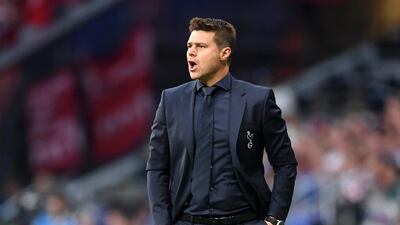Perhaps it is unfair to expect anyone to channel the disappointment of failing to realise an ambition into an immediate, concrete plan for the future.
“It is not a moment now to talk too much,” said Mauricio Pochettino after Tottenham’s Uefa Champions League final loss. But, he suggested, talks will come. Their conclusion is intriguing. Pochettino has become Spurs’ smiling enigma, a man who can both galvanise and tantalise.
Last week, he had described the Champions League final as “the end of an amazing chapter for the club.” The end of the Pochettino years, or merely a turn of phrase? Because defeat in Madrid did mark an ending of sorts. Five years of progress have taken Tottenham to a deluxe new stadium, territories they had not previously charted in Europe and a crossroads.
Pochettino has made a virtue of austerity. After 16 months without a signing, necessity has made him reinvent players. He has conjured improbable achievements from them and, in the process, unlikely feats from the team. He has been the role-model manager, the rebuke to the big spenders, the complainers, the blamers.
And yet realism dictates that there is a limit to what even Pochettino can do. A coveted manager could look at the context and conclude that the prognosis for Spurs is bleaker without change.
Partly because their route to the Champions League final was suitably improbable to render a repeat unlikely. But partly also because Spurs’ squad contains those who overachieved: over a season for Moussa Sissoko, spectacularly at times in Lucas Moura’s case, and occasionally and crucially, for Fernando Llorente.
There are those who have relapsed, like Kieran Trippier, Victor Wanyama, Eric Dier and, most surprisingly, Dele Alli. There are those who are underpaid and who could leave. Toby Alderweireld’s £25 million (Dh116.05m) release clause kicks in this summer. He and Christian Eriksen, whose deal also expires in 2020, could command far bigger salaries and if Spurs do not pay them, there will be a hole at the heart of the side.
Pochettino has made their financial model work, taking a team with a wage bill only £2m above Everton’s to the brink of continental glory, but excellence requires expenditure on the wage bill simply to ensure retain assets.
Some of Spurs’ continuity has been unwanted, but if a side breaks up, a chapter is ending. Pochettino’s net spend remains famously low, at £29m, but an overhaul could be rather costlier.
Yet this could be the genesis of his second side; much like his former Argentina teammate Diego Simeone at Atletico Madrid, he has earned the right to spend more by increasing a club’s revenue with on-field feats, but stadium costs are a drain.
Much like Simeone, he has shown loyalty when his feats have attracted the attention of wealthier clubs. Simeone has continued to achieve, but he might have won more by leaving. Like Pochettino, he retains an appeal, but each is a case study of whether it is better to become a dynastic manager or someone who gravitates to a super-club.
Tottenham have been elevated by Pochettino but, in a sense, they have both progressed and regressed. They posted 86 points in 2016-17 and only 71 this season, 27 points off the pace as Manchester City and Liverpool have accelerated.
That deteriorating return can be attributed to injuries, to post-World Cup fatigue, to Pochettino’s patched-up teams as the Champions League took priority, but the reality is Tottenham lost 20 times this season, including 10 of their last 18 games.
They might just have been the most incongruous European Cup winners ever, which all makes it harder for Pochettino, or anyone else, to say what comes next.


